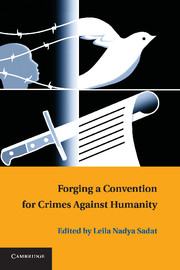Book contents
- Frontmatter
- Contents
- Figures and Maps
- Crimes Against Humanity Initiative: Steering Committee
- Biographies of Contributors
- Foreword
- Preface and Acknowledgments
- Crimes Against Humanity and the Responsibility to Protect
- 1 History of Efforts to Codify Crimes Against Humanity
- 2 The Universal Repression of Crimes Against Humanity before National Jurisdictions
- 3 Revisiting the Architecture of Crimes Against Humanity
- 4 The Bright Red Thread
- 5 Gender-Based Crimes Against Humanity
- 6 “Chapeau Elements” of Crimes Against Humanity in the Jurisprudence of the UN Ad Hoc Tribunals
- 7 The Definition of Crimes Against Humanity and the Question of a “Policy” Element
- 8 Ethnic Cleansing as Euphemism, Metaphor, Criminology, and Law
- 9 Immunities and Amnesties
- 10 Modes of Participation
- 11 Terrorism and Crimes Against Humanity
- 12 Crimes Against Humanity and the International Criminal Court
- 13 Crimes Against Humanity and the Responsibility to Protect
- 14 Re-enforcing Enforcement in a Specialized Convention on Crimes Against Humanity
- 15 Why the World Needs an International Convention on Crimes Against Humanity
- Appendices
- Testimonials and Endorsements
- Index
- References
6 - “Chapeau Elements” of Crimes Against Humanity in the Jurisprudence of the UN Ad Hoc Tribunals
Published online by Cambridge University Press: 01 June 2011
- Frontmatter
- Contents
- Figures and Maps
- Crimes Against Humanity Initiative: Steering Committee
- Biographies of Contributors
- Foreword
- Preface and Acknowledgments
- Crimes Against Humanity and the Responsibility to Protect
- 1 History of Efforts to Codify Crimes Against Humanity
- 2 The Universal Repression of Crimes Against Humanity before National Jurisdictions
- 3 Revisiting the Architecture of Crimes Against Humanity
- 4 The Bright Red Thread
- 5 Gender-Based Crimes Against Humanity
- 6 “Chapeau Elements” of Crimes Against Humanity in the Jurisprudence of the UN Ad Hoc Tribunals
- 7 The Definition of Crimes Against Humanity and the Question of a “Policy” Element
- 8 Ethnic Cleansing as Euphemism, Metaphor, Criminology, and Law
- 9 Immunities and Amnesties
- 10 Modes of Participation
- 11 Terrorism and Crimes Against Humanity
- 12 Crimes Against Humanity and the International Criminal Court
- 13 Crimes Against Humanity and the Responsibility to Protect
- 14 Re-enforcing Enforcement in a Specialized Convention on Crimes Against Humanity
- 15 Why the World Needs an International Convention on Crimes Against Humanity
- Appendices
- Testimonials and Endorsements
- Index
- References
Summary
INTRODUCTION
Crimes against humanity is the common element in the law and practice of the International Criminal Tribunal for the former Yugoslavia (ICTY) and the International Criminal Tribunal for Rwanda (ICTR). It is the glue that ties these institutions together in terms of their subject matter jurisdiction. Looking at the judgments of the ICTY, one notices the difficulty in securing convictions for genocide, but crimes against humanity figure prominently in both indictments and convictions, with the exception of a few cases only dealing with war crimes. At the ICTR, genocide is the focus in practically all cases, but each genocide accusation is backed up by crimes against humanity accusations, especially extermination, murder, and persecution; thus the ICTR confirms the (historically) close relationship between both sets of crimes. But the ICTR rarely convicts for war crimes, for the reasons that the prosecution does not tend to include it in the indictment and that in (early) case law, ICTR Trial Chambers found no nexus between genocidal acts and the armed conflict. As far as the Special Court for Sierra Leone (SCSL) is concerned, it has no jurisdiction over genocide, but only over war crimes, crimes against humanity, and a limited set of crimes under Sierra Leonean law. All judgments of that court deal with allegations of both war crimes and crimes against humanity.
Thus, the UN ad hoc tribunals truly are crimes against humanity courts and undeniably have in their practice contributed significantly to the definition and understanding of the crime.
- Type
- Chapter
- Information
- Forging a Convention for Crimes against Humanity , pp. 102 - 141Publisher: Cambridge University PressPrint publication year: 2011
References
- 8
- Cited by



